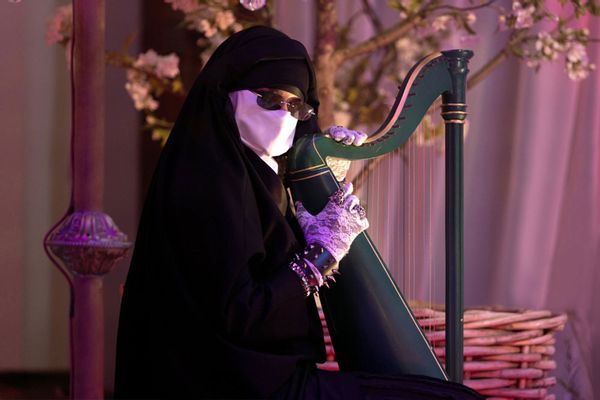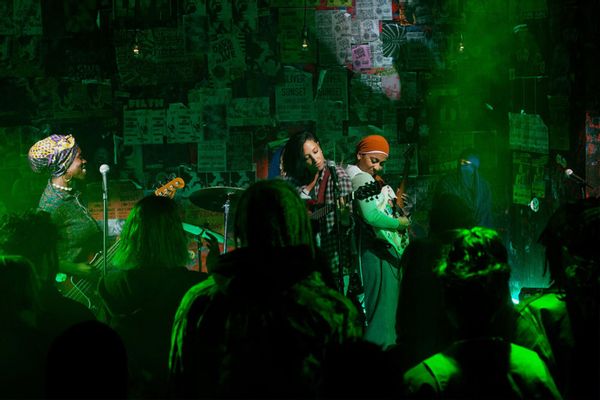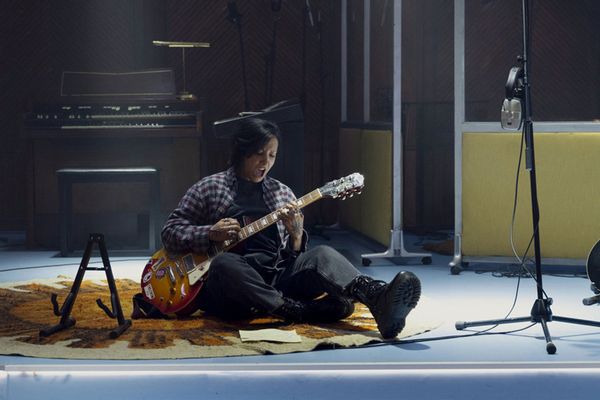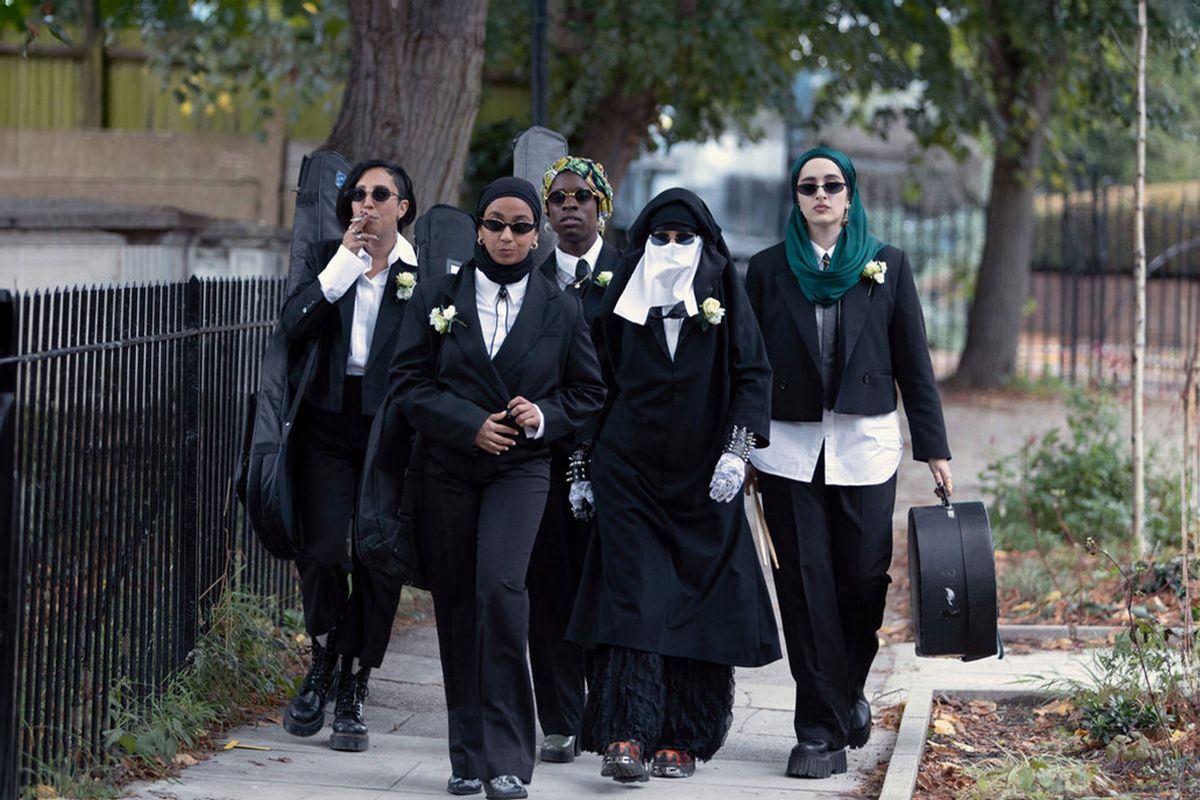Fiery. Dissonant. Raw. Punk rock bear-hugs these traits but its freedom and catharsis are more prevalent – just below its defining characteristic: fun. Nida Manzoor had channeled all that electricity into the flawless first season of “We Are Lady Parts” as her all-woman Muslim punk band battled their way through London’s white and male-dominated rock scene.
First, the band had to get people to take them seriously. Then they had to find a venue that would book them.
When none opened their doors, Saira (Sarah Kameela Impey), Ayesha (Juliette Motamed), Bisha (Faith Omole), Momtaz (Lucie Shorthouse) and Amina (Anjana Vasan) leaned into the movement’s D.I.Y. principles, building their own stage in a construction supply yard.
The fans showed up – as did a doubting Amina, who was nearly shamed out of her calling as a gifted guitar player by peers demanding she act like a proper Muslim woman.
Storming the scene in 2021 to raves and universal acclaim won Manzoor’s scrappy comedy a devoted fanbase too. But while the latest Lady Parts adventures pick up mere weeks after their live show triumph, the show’s faithful fretted over Peacock’s delay in greenlighting a second season. That has finally arrived — almost a full three years after the first dropped.
So why the delay? Was the BAFTA and Peabody Award-winning comedy, like its heroines, too punk rock for the tastes of a major media conglomerate? Not at all. The opposite is the case, Manzoor explained in a video call from her home in Britain. She had already committed to another gig by the time her TV show wrapped: her well-received 2023 martial arts action feature “Polite Society.”
“Films take a while. I didn’t realize how long it would take,” Manzoor told Salon. “But essentially, I went straight off the show, onto the film, off the film, back into the show.”
“I realize that for people it’s like, ‘What’s been going on?’” she added, “but I haven’t stopped.”
The good news is that her disciplined focus has yielded a second season that’s tighter and even more thrilling than its perfectly scored predecessor, which is saying something.
Still, popularity and success bring other problems like the burden of high expectations. The Pakistani Muslim creator, director, writer and executive producer of “We Are Lady Parts” likens the pressure she felt to “second album” anxiety, which might have informed her band’s sequel adventures.
“Real representation will only occur when there are multiple voices.”
“We Are Lady Parts” tore onto the scene in the throes of the pandemic with its wondrous vision of “sisters who pray together, play together, speaking our truth to whoever can be asked to listen,” as Saira says. It remains the one show on TV that depicts Muslim women in all their joyful diversity, hijabi or otherwise. Shorthouse’s band manager Momtaz rocks her niqab, dancing furiously to every beat and tight melody, playing backup dancer whether the band plays their signature tunes or burns through pop idol covers.
 Lucie Shorthouse as Momtaz in “We Are Lady Parts” ( (Saima Khalid/WTTV Ltd/Peacock/C4)Vasan’s Amina, though, is the story’s resident butterfly. A guitar prodigy who keeps her affection closeted – as in, she hides her concert poster collection on the inside of her wardrobe doors – she is the quiet nice girl whose spirit is too fierce to play small. Where the first season captures Amina’s journey of defining herself instead of succumbing to stifling definitions of feminine propriety, the second challenges her and the rest of the band to figure out what price they’re willing to pay to enter the mainstream marketplace.
Lucie Shorthouse as Momtaz in “We Are Lady Parts” ( (Saima Khalid/WTTV Ltd/Peacock/C4)Vasan’s Amina, though, is the story’s resident butterfly. A guitar prodigy who keeps her affection closeted – as in, she hides her concert poster collection on the inside of her wardrobe doors – she is the quiet nice girl whose spirit is too fierce to play small. Where the first season captures Amina’s journey of defining herself instead of succumbing to stifling definitions of feminine propriety, the second challenges her and the rest of the band to figure out what price they’re willing to pay to enter the mainstream marketplace.
As in Season 1, the second is still narrated by Amina, only now she works in a lab, shredding beside her bandmates after hours. But Amina keeps her musical identity to herself — a feature of her self-declared Villain Era which is, of course, a joke. Vasan’s character remains the nerdiest in the band and is still prone to social anxiety.
Some of that has lessened now that Lady Parts is a known entity whose public is clamoring for an album. Alas, adoration doesn’t pay for studio time. Neither do their day jobs.
Manzoor knows how difficult such negotiations can be. Aside from the usual industry restrictions both contractual and unspoken, there are notions related to gatekeeping she and the other Muslim women in her writers’ room wanted to smash.
“One thing that definitely came up for all of us was this feeling of ‘there’s only room for one of us,’ and that that was the narrative that we’ve absorbed,” she said. “It just felt like we need to upend this.
“Real representation will only occur when there are multiple voices,” she continued, “not just one voice in a space representing one community.”
 Faith Omole as Bisma, Sarah Kameela Imprey as Saira, Anjana Vasan as Amina Hussain, Lucie Shorthouse as Momtaz in “We Are Lady Parts” (Saima Khalid/WTTV Ltd/Peacock/C4)That doesn’t mean there isn’t something to be explored in the insecurity that industry-bred competitiveness brings out when a fan group called Second Wife begins overtaking Lady Parts’ popularity by performing emo covers of their songs online.
Faith Omole as Bisma, Sarah Kameela Imprey as Saira, Anjana Vasan as Amina Hussain, Lucie Shorthouse as Momtaz in “We Are Lady Parts” (Saima Khalid/WTTV Ltd/Peacock/C4)That doesn’t mean there isn’t something to be explored in the insecurity that industry-bred competitiveness brings out when a fan group called Second Wife begins overtaking Lady Parts’ popularity by performing emo covers of their songs online.
They’re not the true antagonists in these new episodes. Most of the conflict Saira, Ayesha, Bisha and Amina face sprouts from within. Amina is still seeking love and is too concerned about what people might think about her choices. Bisha tries to balance motherhood with the vision of herself as a rock star; Ayesha struggles with the responsibility she bears to other queer Muslims.
Saira, Impey’s cool and frequently glowering lead singer, twists herself in knots over each step Momtaz knows to be necessary if they want to build a following, including product endorsements. She holds her anti-establishment ideals close to her heart, which makes the scene that closes the fifth episode especially torturous.
 Sarah Kameela Imprey as Saira in “We Are Lady Parts” (Saima Khalid/WTTV Ltd/Peacock/C4)By that turn the band has achieved a milestone every professional musician chases and realizes the compromises are too much; even during a private moment of creative flow, the restrictions placed on her prevent her from saying out loud anything the powers that be may deem too political.
Sarah Kameela Imprey as Saira in “We Are Lady Parts” (Saima Khalid/WTTV Ltd/Peacock/C4)By that turn the band has achieved a milestone every professional musician chases and realizes the compromises are too much; even during a private moment of creative flow, the restrictions placed on her prevent her from saying out loud anything the powers that be may deem too political.
Manzoor weaves surreal asides and fantasy throughout the action, making Saira’s struggle increasingly physical and violent the more she struggles. It’s agonizing to watch, but perhaps not as much as it is to know that the line activating invisible forces to rise against her was written well before the ongoing catastrophe in Gaza. War, as a term, is miserably timeless and therefore eternally timely.
“I realize that for people it’s like, ‘What’s been going on?’ But I haven’t stopped.”
“Unfortunately, Muslim suffering isn’t anything new,” Manzoor observed. “When we wrote and conceived it, I wanted it to not be about a specific issue, because, for me, this is a half-hour comedy show, and there’s no way I have the real estate to go and to really give any political issue, any horrible atrocity, the due I can.”
What she could do is present the artist’s point of view when it comes to navigating firestorms in any public-facing entertainment role. Not simply that, but show that even artists are not of one mind.
“We are political just by existing. Just by taking up this space, we are political,” Bisha says to Saira as they confront the tension between breaking out as a hardcore band singing “funny Muslim songs” like “Bashir with the Good Beard” or using their newly earned clout in the music world to do the very punk rock act of speaking out against injustice.
Bisha is right in a way, which “We Are Lady Parts” proves by taking up more space in the pop culture dialogue with a Western-themed cameo by Nobel Prize winner Malala Yousafzai.
Want a daily wrap-up of all the news and commentary Salon has to offer? Subscribe to our morning newsletter, Crash Course.
But the most straight-to-the-heart encounter and exchange may be between Saira and a punk icon she idolizes (played by comic Meera Syal). Her beloved legend never compromised and remained a marginalized entity for it, and yet she opened the door for We Are Lady Parts to take up that space. So what are they beholden to do with what Sister Squire made possible?
“It’s certainly something that I felt like I was grappling with in terms of being a comedy writer, and feeling like comedy never does enough,” Manzoor explained, quickly adding, “Again, I don’t know if I agree with that. But I wanted to show a punk from an older generation who’s really had to fight . . . and give her complexity.”
Manzoor also wanted to incorporate a theme of generational support – first through the Millennial band’s initial trepidation about Second Wife, a Gen Z band, then by connecting Saira to Sister Squire, her Gen X hero. She wants to celebrate the broader legacy art and music weaves between women of color – “the support and the pressure and the jealousy and the bitterness, and the love and all the complex feelings that come that come with not being given adequate space to express yourself,” she said.
And through this arc, Manzoor hopes audiences will ask themselves what success looks like. Is it selling out stadiums and scoring a major label record deal, she wondered, or does it look like finding a safe space where you can speak, create, and share your art freely? That we get to see her version of answering those questions in new episodes of “We Are Lady Parts” feels like a gift – one that took a little while to arrive but is beyond worth the wait.
All episodes of “We Are Lady Parts” are streaming on Peacock.
Read more
about this topic

